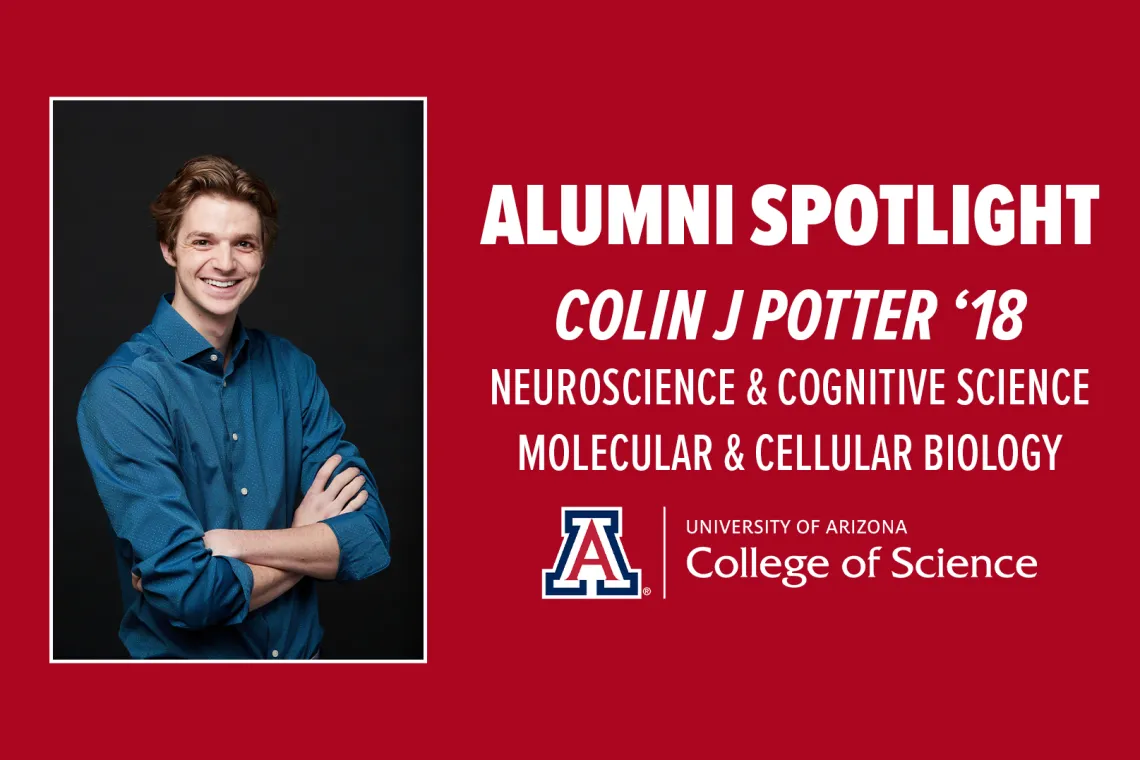Alumni Spotlight: Colin J Potter

Colin J Potter, a Tucson native and 2018 graduate with a double major in Neuroscience & Cognitive Science and Molecular & Cellular Biology, had no second thoughts about continuing his education post-graduation. After graduating with a double major in 2018, he pursued an MD/PhD dual degree in the College of Medicine at the University of Arizona. Potter received a MS in Optical Sciences in 2022 and expects to complete his MD/PhD program in 2026.
Potter spoke with the College of Science to reflect on his time as an undergraduate and how it prepared him for the rest of his academic career.
Colin J Potter
Current Position: 5th year MD/PhD Student, College of Medicine - Tucson, Wyant College of Optical Sciences, University of Arizona
Hometown/current town: Tucson, AZ
Degrees from UA:
- BS (2018) - Neuroscience and Cognitive Science, Molecular and Cellular Biology, Minors: Mathematics, Biochemistry
- MS (2022) - Optical Sciences
- Expected 2024: PhD - Optical Sciences
- Expected 2026: MD - Optical Sciences
College of Science: How did your time at University of Arizona and College of Science prepare you for post-graduate life and your career today?
Potter: For my BS at UA CoS, I took advantage of many opportunities to pursue a variety of interests in Neuroscience, Biology, Biochemistry, and Mathematics. With a strong foundation in these areas, I was able to succeed in the MD program here, and to be accepted and pursue a PhD in Optical Sciences as well. My studies for my BS ensured that I had all the prerequisites to pursue this path and that I was well-prepared moving forward. I also worked in a lab, which enabled me to develop as a writer, speaker, and scientist, all of which have been helpful for my current position.
CoS: What drew you to the departments when you were deciding on your major as a student?
Potter: I first joined the NSCS program for several reasons. I was fascinated with neuroscience. It was and continues to be a fast-growing and innovative field of study, incorporating a variety of backgrounds into one field. I was also drawn by the unique structure of the program, covering both neurobiological and psychological components of this field which I felt was important for a complete understanding of the brain. Finally, NSCS had a strong sense of community. Being a smaller program with an application process to enter the full major, it was able to develop a group of very intelligent and motivated students that I wanted to be a part of. I added MCB as a second major because the requirements coincided with some courses I was interested in taking, but I never got as involved in that program as I was in NSCS.
CoS: When you look back on your time as a Wildcat, what memories stand out? Any favorite classes, labs, mentors, or research projects?
Potter: I remember some really fun experiences I had working in Dr. Anita Koshy's lab in college. From the first time I used a microtome to section a mouse brain to my first poster presentation at the Society for Neuroscience Annual Conference, those experiences definitely stand out. I also remember two of my favorite professors and the classes they taught, Dr. Lynne Oland (who created the NSCS program) and Dr. Leslie Tolbert. These professors served as mentors in a variety of ways and their classes were fascinating and interesting.
CoS: After earning your BS, what has surprised you most about how your education has impacted your success?
Potter: I have been most surprised about how my minor in Mathematics has impacted me thus far. I added Mathematics on a whim halfway through college, simply because I was interested in taking some math classes. Then, in my final semester of college, I decided that instead of pursuing a PhD in Neuroscience like I was initially planning, I wanted a PhD in Engineering or Optics. As it turned out, my PhD in Optical Sciences would not have been possible had I not completed the Math minor, as the prerequisites for the program included those courses. Also, I was surprised by how much my strong foundation in research would positively impact my current work and my success in applying to MD/PhD programs.
CoS: What advice would you give to someone who is interested in pursuing an education or career in science?
Potter: I would say try everything you can. If you are curious about something, just try it out. There is a lot of time and freedom to try new things early on in college, and you should take advantage of everything you can. If you overextend, you can always drop some things until you reach a balance you like. My experience has been that following my interests pays off. Even if an activity is not required for anything right now in life, it ends up being useful later on. Math is a good example of this. Additionally, finding something that excites you professionally and personally will help guide you to choose the right career and set you apart from your peers in the future. No one wants to hire or accept someone into a program who did all the "right" things but hated them the whole time. Better to follow your interests and enjoy what you do. Finally, there is no "right" path to follow to end up in your career, and it is not a race to the end. You can try many things and change your mind several times before arriving at your career, and even then you can change it. The value you bring to the table is related to your experiences, expertise, perseverance, and breadth and depth of your knowledge.

